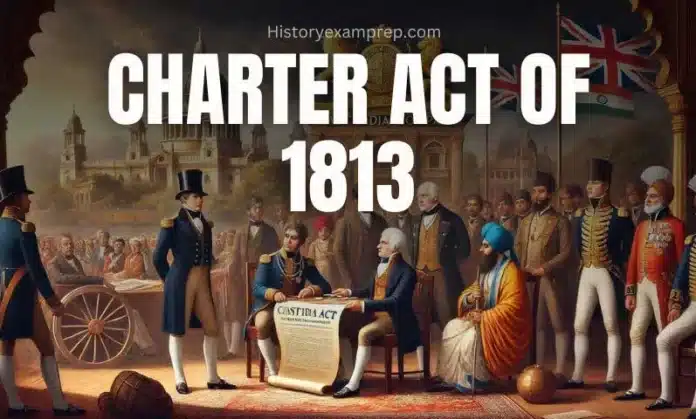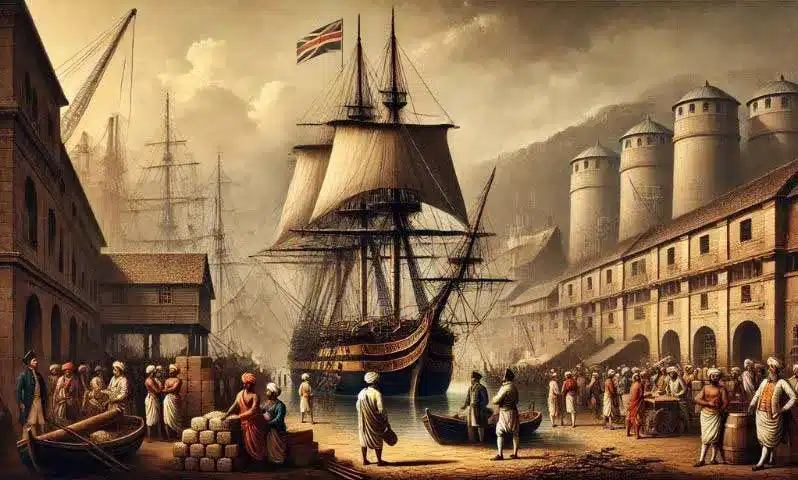After the British East India Company acquired the Diwani of Bengal, Bihar, and Odisha in 1765, the Charter Act 1813, or East India Company Act 1813 was issued by the British Parliament to address the changing social, political, and administrative chaotic situations.
The Charter Act of 1813 put an end to the Company’s trading monopoly in India and established the control of the British Government over the territories under their control. With this sovereign power in place, the Company was made responsible for carrying on the business and administration in India for a further period of 20 years of extension.
At the same time, it was also stated that no individual from England could directly join the Company’s high positions in special areas without qualifications. In short, it can be said that the Charter Act of 1813 made provisions to transform the British East India Company from a commercial institution to merely a political institution.
What is Charter Act 1813?
The Charter Act 1813 was one of several charter laws issued by the British Parliament every few years to regulate the East India Company’s monopoly rights and power to conduct business in India.
The Charter Act of 1813 was thus an important benchmark in the push toward westernization of India. The Charter Act of 1813 was a legal step that strengthened the political and administrative foundation of British rule in India, and subsequently, one by one, Indian regions were forced to lose their independence of self-governance and accept British sovereignty.
The Company’s Charter Acts were renewed every 20 years. Accordingly, a total of four Charter Acts were passed: Charter Act of 1793, Charter Act of 1813, Charter Act of 1833, and Charter Act of 1853.
Purpose of introducing the Charter Act 1813
The main purpose of the Charter Act of 1813 was to reorganize British rule in India and directly increase British control over financial matters to administrative work of the Company in India for another 20 years.
The free traders who had become dominant in British politics were demanding free access to India. According to them, this will bring development in India by bringing capital and skills. The Benthamite reformists and the evangelicals influenced British Policies in India. All these aspirations for the change in Britain’s Indian policies were enacted by the Charter Act 1813.
You can also read about the The Regulating Act 1773: Purpose and Impact of this Act.
Background of Charter Act 1813
Several backgrounds were working behind the Charter Act of 1813, these were:
- At this time, the Company had sought a loan from the British government due to extensive financial losses incurred during Lord Wellesley’s numerous wars and territorial expansions. For this reason, the British Parliament appointed an investigative committee to examine the East India Company’s activities. When this committee’s report was published in 1812, the members of Parliament came to know everything about the Company’s activities in India. This experience was used in drafting the Charter Act of 1813.
- By 1806, Napoleon Bonaparte realized that although all the powers of Europe were defeated and forced to establish alliances with him, England, the ‘Queen of the Seas’, would never accept it. Rather, on the contrary, England continued the war against him with great power. Napoleon knew very well that England could never be defeated in a naval war, so he adopted a policy of economic blockade.
- Through this policy, he declared that no British ship could go to any port in Europe and no European state could import any goods from England. This economic blockade policy is known as the ‘Continental System‘.
- To make this system more effective, he issued the Berlin Decree in 1806 and the Milan Decree in 1807.
- These Decrees stated that no goods from England would be allowed to enter the ports of France or its allies or neutral countries. Meaning that commercial relations between England and its colonies with other European countries were prohibited.
- In such circumstances, due to the disruption of British trade in mainland Europe, British merchants pressured the Parliament to open the doors for free trade in India as compensation for their losses. Additionally, Christian missionaries demanded the freedom to spread Christianity in India for the so-called moral development and removal of superstitions of the Indian people.
- Alongside this, British liberalism and Bentham’s Utilitarianism influenced British politics in Britain and British administrative policies in this country, which led British merchants to appeal to the government for trade access in Asian ports. However, when the East India Company showed a negative attitude towards separating political and commercial benefits, the British ministry prepared the draft of the Charter Act of 1813 keeping all these issues in mind, and eventually, it was passed in Parliament.
- The Charter Act of 1813 curtailed the East India Company’s monopoly over trade and opened India for free trade to other British merchants.
You can also read about the Subsidiary Alliance System 1798: Origins, Impact and Facts.
Features of Charter Act 1813
- It renewed the Company’s Charter for twenty years, and during that period it was allowed to have its territorial possessions.
- The Company was deprived of its monopoly commercial rights.
- Although the company’s monopoly was lost to India, the company still retained its monopoly on tea trade with China for 20 years.
- The powers of the Board of Control were further enlarged and the commercial functions were done away with.
- After the Charter Act of 1813 was presented in the British Parliament, a new clause was added under public pressure. This clause, number 43 of the Charter Act of 1813, included a directive regarding education. This education-related directive imposed two responsibilities on the Company. One was to strive for the revival and improvement of literature in India, and the other was that the Company had to spend one lakh rupees annually on education after meeting all its other expenses to introduce science education among the natives. This clause can be considered the first government step in the history of English rule in India regarding education.
- The Charter Act of 1813 recognized private efforts in the field of education and gave freedom to Christian missionaries to spread English education among Indians, propagate Christianity, and work for moral and spiritual development. However, they had to enter this country only with the permission of the court of directors or board of control.
- The company’s shareholders were given a 10.5 percent dividend in the revenue of India.
- The company was instructed to keep its financial accounts in India in two separate accounts, one for trade and the other for revenue.
- The regulations made by councils of Madras, Bombay, and Calcutta were now required to be laid before the British parliament. Thus, for the first time, the constitutional position of the British territories was clearly defined.
- It was made mandatory to provide proof of appropriate educational qualifications for employment in the East India Company. For civilian officers, obtaining a certificate from Haileybury College in England and for military officers from Addiscombe Military Seminary was mandatory.
- If any Englishman or British citizen voluntarily wanted to spread the English language in India and buy land to settle, they had to obtain permission from the Court of Directors.
- East India Company was prohibited from maintaining more than 29,000 troops. This Charter Act of 1813 stated that the money received from Indian revenue would first be used for the maintenance of the armed forces and then for the payment of interest on the Company’s debt.
- The Governor General was given the power to revoke any person’s license and expel that person from the country.
You can also read about the Pitt’s India Act 1784: Origin, Key Provisions, and Impact.
Importance of Charter Act 1813
The important aspects of this Charter Act were:
- All British merchants were given access to do business in India. This indicated the establishment of ultimate British government authority in British India.
- Gradually, more importance was given to merit-based recruitment of government employees.

